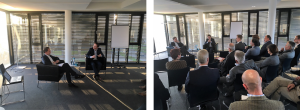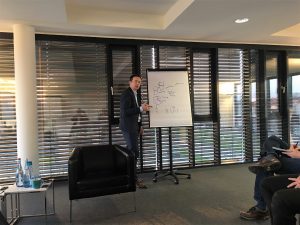- Home
- Events
- Think Talks
- Analogue is the new organic
Analogue is the new organic
Digitalisation – hardly any other topic currently needs to be examined and discussed from the perspective of organisational intelligence in such a well-founded and unconventionally critical manner. For an unconventional discourse on this topic, you need…
Digitalisation – hardly any other topic currently needs to be examined and discussed from the perspective of organisational intelligence in such a well-founded and unconventionally critical manner.
However, in order to engage in unconventional discourse on this topic, one needs a discussion partner who is both an unconventional thinker and a true expert on the subject, preferably with interdisciplinary qualifications and the ability to intelligently link important and correct information across a broad spectrum of reality levels.
In Dr Hans Jörg Stotz, we found just such a discussion partner as a special guest for our thinktalk@newandable on 28 March: he is not only Senior Vice President of IoT Strategy & Innovation at SAP SE, but also holds a doctorate in philology in the subjects of philosophy and art history. It is no exaggeration to describe him as an exceptional figure in the top management of a German IT group that is a global market leader.

The unconventional discussion with him and our guests focused primarily on the consequences for management, strategy, leadership and culture in companies in the context of digitalisation.
For those who couldn’t be there, here is a condensed summary in four chapters:
- In the context of digitalisation, competition is increasingly about business models and less and less about products. Long-standing, successful product- and service-oriented business models are becoming vulnerable in the context of digitalisation and are being challenged at an increasing pace by completely new types of business models, which in the worst case can even destroy them. With a simple but unusually radical question, companies can and must take the first step away from a defensive stance and move into an offensive one by putting themselves in the shoes of their toughest (and usually unknown) competitors: How can I destroy myself? How do I attack myself?
- Seriously asking this question requires leadership to demonstrate both courage and radical rethinking. Those who do not ask themselves this question inevitably find themselves on the defensive, stuck in an attempt to defend the familiar and established, rather than proactively embracing the new. Only when the answers to this radical question are as radical and honest as the question itself can a company begin to become constructive and “reinvent” itself.
- In the context of digitalisation, it is increasingly important to be able to reconnect and coordinate existing products and services (from other companies) in intelligent networks and make them attractive to the market and potential customers. Brand is replacing traditional assets.

- Intangible assets are gaining in importance, and traditional criteria for company valuation are no longer sufficient. But how can intangible assets be assessed? So far, rating agencies have mostly not taken this question very seriously. Accordingly, they too are challenged to develop new models if they want to survive.
When a guest asked whether and how one might simply opt out of digitalization, Hans Jörg Stotz gave yet another of his many surprising answers to the thought-provoking questions our guests had posed throughout the evening: “Analog is the new organic.”
With the ongoing digitalization of everyday life, there are — albeit still in their infancy — noticeable countertrends pointing toward a return to analog technology and communication, as well as a desire for greater autonomy. Yet in the long run, it seems unlikely that anyone will be able to fully escape the effects of digitalization. The fundamental global shifts in power resulting from the generation, use, and commercialization of data have developed their own momentum — one that could only be halted by a collapse of the systems themselves. But would that really be a desirable scenario?
Our thinktalk@new&able takes place once or twice a year. If you would like to receive an invitation to the next thinktalk, simply send us an email to info@new&able.com.




